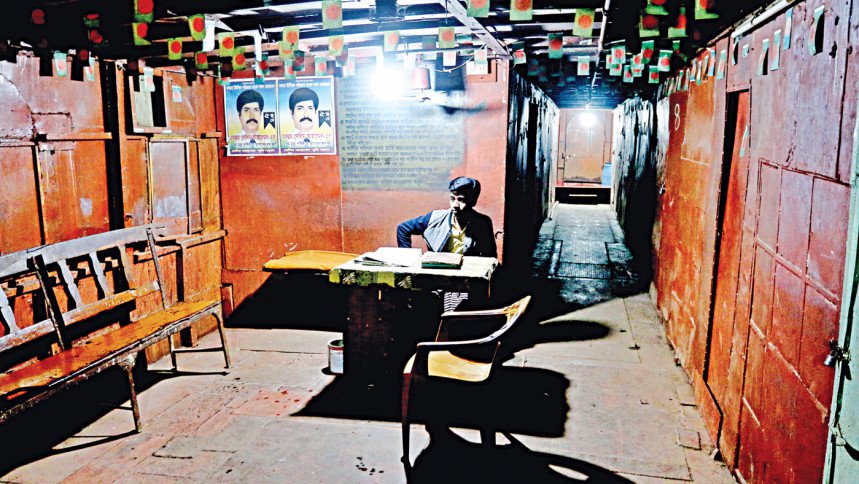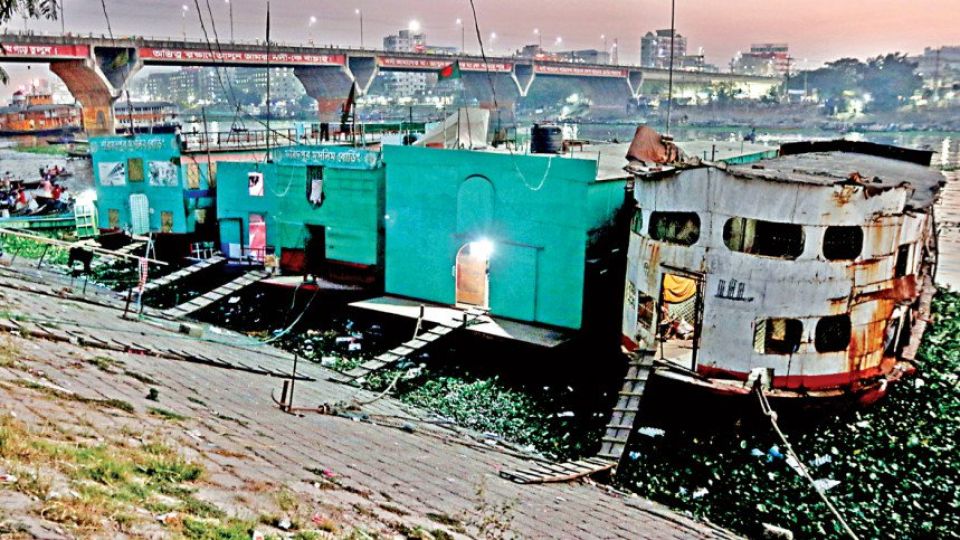January 3, 2022
Right under Babubazar bridge in the capital, beside the Mitford morgue, there is a hub of floating boarding houses that many in the city have no clue of.
Made out of steel, these two-storey boat-boardings are almost like trawlers, only without any engines. When this correspondent visited the area recently, five of them were anchored at the bank of the river.
Inside the boats, rooms are roughly six feet in height, four-and-a-quarter by two-and-a-half feet in length and breadth. Depending on size, the rooms range from Tk 50 to 150, with the latter capable of housing five people at a time.
They remain open from 6:00am-2:00am, shutting down for three hours in fear of thieves

WITH ROOM RENTS RANGING FROM TK 50 TO TK 150 PER DAY, IT’S NO WONDER THAT THE CUSTOMERS OF SADARGHAT’S BOARDING HOUSES PREFER THEM OVER OTHER CHEAP HOUSING FACILITIES, LIKE A RESIDENTIAL MESS. ON TOP OF THIS, THE ROCKING SENSATION CREATED BY WAVES AND THE SOUND OF RAINDROP ON THEIR TIN ROOFTOPS GIVE THIS PLACE A FEEL LIKE NO OTHER. PHOTO: ANISUR RAHMAN
This correspondent spoke to Shariatpur Muslim Boarding’s manager Shah Jamal. He said its owner Abdus Sattar started the business, the first of its kind here, in 1960. After he passed away, he passed it on to his son. The two-storey hotel has a total of 52 rooms.
The manager said usual customers are people from the lower-income category, especially those without a secure source of income. Unlike most paid living facilities, some customers stay here for years, with one particular customer staying for over 40 years!
The owners accommodate the customers by determining rates by keeping their convenience in mind. The boarding provides free blankets, water, and electricity.
When this correspondent spoke to Hasan (25), he was talking to his five-year-old son on video call. A fruit seller at Old Dhaka’s Badamtoli, he said he’s been staying here at a Tk 80 room for 6 months. He used to spend Tk 1,500 per month at a residential mess before, but said this is more convenient as the boarding house charges per day, with free amenities.

Faridpur Muslim Boarding’s manager Mostafa Kamal said they’ve been running it for 33 years. The two-storey facility now has 48 rooms.
At Sabuj Mia’s Boarding, formerly known as Buriganga Boarding, there are around 30 rooms. One of its customers Md Rasel works as a day labourer at Sadarghat area. He said he’s been staying here for 7 years, at one of Sabuj Mia’s Tk 50 mass rooms.
As a long-timer, he has build rapport with staffers, who often lend him money and let him stay on credit when times get hard.
“I enjoy the mild rocking sensation on the boat due to waves. It’s not too noisy as it’s quite far from the terminal. It also has a nice view, especially during monsoon, while the sound of raindrops on its tin roofs is just the icing on the cake,” he said.
The boardings provide no food, but it can be brought in from the outside. Most of the boats are quite old, repaired contstantly to keep them afloat.
Although there’s just five such boats now, there used to be more, with around 10-11 in operation during the Pakistani period. During Ershad’s regime, a Hindu-owned boat was torched in the aftermath of India’s Babri Masjid massacre. This was one of the turning points, after which the numbers started falling.
The over 200 people who live in these five boats in close proximity kind of make up their own mohalla. Other than the persistent threat of mosquitoes and the foul smell of a decaying Buriganga, those who stay here say it makes for a pretty decent community life.


